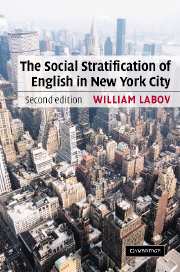Book contents
- Frontmatter
- Contents
- Introductory note
- Preface to the first edition
- Preface to the second edition: forty years later
- I Problems and methods of analysis
- II Social differentiation
- III Social evaluation
- 11 Subjective evaluation of the variables
- 12 Self-evaluation and linguistic security
- 13 General attitudes towards the speech of New York City
- IV Synthesis
- Glossary of linguistic symbols and terminology
- Appendix A Questionnaire for the ALS Survey
- Appendix B Anonymous observations of casual speech
- Appendix C Analysis of losses through moving of the MFY sample population
- Appendix D Analysis of the non-respondents: the television interview
- Appendix E The out-of-town speakers
- Bibliography
- Index
13 - General attitudes towards the speech of New York City
Published online by Cambridge University Press: 18 December 2009
- Frontmatter
- Contents
- Introductory note
- Preface to the first edition
- Preface to the second edition: forty years later
- I Problems and methods of analysis
- II Social differentiation
- III Social evaluation
- 11 Subjective evaluation of the variables
- 12 Self-evaluation and linguistic security
- 13 General attitudes towards the speech of New York City
- IV Synthesis
- Glossary of linguistic symbols and terminology
- Appendix A Questionnaire for the ALS Survey
- Appendix B Anonymous observations of casual speech
- Appendix C Analysis of losses through moving of the MFY sample population
- Appendix D Analysis of the non-respondents: the television interview
- Appendix E The out-of-town speakers
- Bibliography
- Index
Summary
[This chapter describes a form of sociolinguistic behavior where New York City is far from typical of the speech communities of the world. Chapter 9 pointed out that underlying attitudes towards language are evoked more accurately when the subject doesn't realize that language is in question. However, New York is at one extreme of a continuum of linguistic insecurity, and the effect is so strong that the negative assessment of the New York City vernacular emerges even under direct questioning.]
At many points in the course of this study, it has been emphasized that the behavior which we are studying lies below the level of conscious awareness. Very few of the informants perceive or report their own variant usage of the phonological variables, and fewer still perceive it accurately. This does not mean that New Yorkers do not give a great deal of conscious attention to their language. Most of the informants in our survey have strong opinions about language, and they do not hesitate to express them. But their attention focuses only on those items which have risen to the surface of social consciousness, and have entered the general folklore of language. Just as the reporting of usage in the self-evaluation test is essentially inaccurate, so most perception of language is not perception of sense experience, but of socially accepted statements about language.
- Type
- Chapter
- Information
- The Social Stratification of English in New York City , pp. 324 - 342Publisher: Cambridge University PressPrint publication year: 2006



